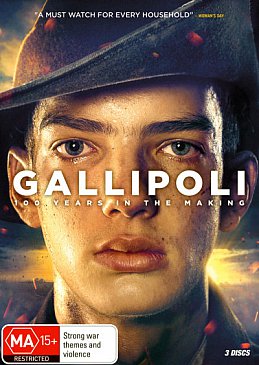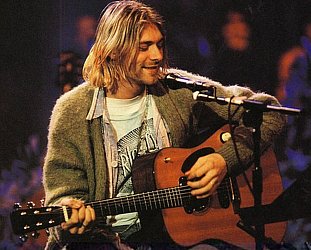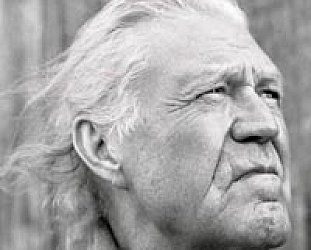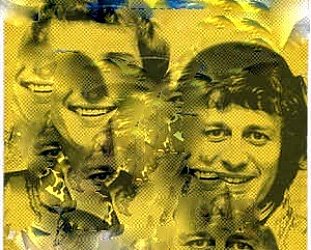Graham Reid | | 3 min read

On Anzac Day there was a commemoration in the hall of my former, all male secondary school. Beneath the names of hundreds of successful students and the gaze of past principals and teachers with more than 35 years' service, a very large number of people – of all ages and cultures – bowed their heads in prayer (to the Christian God and His son Jesus Christ) and listened respectfully to speeches.
The school prayer was read by the principal (“Give us the spirit of truthfulness and manliness . . .”, I don't remember those lines from back then, maybe its a new prayer) and outside on the lawn were numerous white crosses in the names of the fallen – teachers and old boys – who were killed in The First World War, also known as The War to End All Wars.
The school boys – young men actually – who spoke were impressive, and there was a representative of the army who also made a decent speech although from what I gleaned of her background this diminutive woman had not seen any active service.
I had mixed feelings about that but concluded I'm glad she hadn't had to go through it. Just as I and my children have not.
And so the morning went, and there was the repeated refrains of honour, sacrifice, duty, courage, heroism, mateship and how a special spirit was forged in that godawful debacle that was the Gallipoli Campaign.
Lest we forget.
These are the words which hung in the air at every such service I am guessing – certainly at every one I caught footage of on television news or Maori Television – and I'm in no position to deny the truth of any of that.
But I have wondered more and more about Anzac Day and the journey to Gallipoli that many people make . . . and just how big a day this has become in our national consciousness. It was not like this two decades ago and some would say that as each new generation comes along it is more and more curious to engage with what is rapidly becoming the distant past.
Maybe so.
But I also have an unease about just how readily those elusive, indefinable words like “honour”, “sacrifice”, “duty” and so on have entered our national monologue. They are push-button words, like “freedom”, and to me sound hollow coming from the tongues of so many we see on the public stage at this time.
Gallipoli has also subsumed all the other conflicts where New Zealanders died, and the poppy (from Flanders in France, lest we forget) has become associated with that campaign in the minds of many.
The old soldiers didn't speak much about it afterwards, aren't around today to talk about it if they wanted to (one television commentator seemed the think the old veterans were from WWI) and still photos – often just those which got past the censor – can't tell us the brutal truth of war.
So we must look to history books (in an age where many people won't read anything over 150 words), documentaries or even historically-correct fictions like this seven-part Australian television series.
It screened recently in New Zealand but, as with most people, I can't plan my week around television and if I record something it is a matter of finding the time to watch it. But after coming home from the commemorative service at my old school, I sat down and watched the whole of this series . . . and it was compelling.
Of course it a fictional construction and tugged at some deliberately sentimental heartstrings (is sentiment a bad thing?), but it also doesn't shy away from the brutal truths about Gallipoli: that war is about sudden and random death; about lingering death through disease and dysentery; and that soldiers are ordinary people who are terrified, cynical, heroic, cowardly, hungry and just want to go home for the most part.
It laid out with simple clarity just what a mismanaged, pathetic, inhumane and arrantly stupid chain of command there was. (Incidentally the much decorated General Hamilton who mostly helmed the massacre of the troops under his command went home to England and by the time the Second World War rolled around was an admirer of Adolf Hitler.)
Gallipoli is a fictional story of one young man (a 17-year old volunteer) and his cobbers on that blighted bit of land in a small corner of the planet. But at a time when the push-button words trip from tongues it reminds you of a fundamental truth about war.
It is about death and dying, of bodies blasted apart and left to bloat and rot, of men burying bodies and bits of bodies, of rare moments of kinship and compassion and mostly about something we prefer not to think about by using those elusive but evocative words as a kind of default setting.
War is about killing and killing and killing . . .
Lest we forget.





Dee - Apr 26, 2015
Thanks for so eloquently stating what I know I for one think and feel - I used to attend dawn services well over 20 years ago, when the only people attending were veterans (of whom there were many more around then of course), and us girl guide and scout troops. In my memory it always seems to be raining and cold! It also seemed boring and oh so remote and it would be many more years before I realised the scope and impact of both world wars; it's only in very recent years I learned I had (indirect) ancestors killed in WWI as well as learning more about my family's involvement in WWII. I'm increasingly uneasy about the way we revere this day and WWI in particular, and the nation-building myths that surround it to the exclusion of anything that doesn't fit - where are the women's stories? Where are the conscientious objectors stories? Where is the examination of current day wars and injustices and our role in 'fighting' or denying those, as suits? I can't help but feel as if we - NZers and the world - haven't learned our lessons at all and I wonder how we - modern day NZers - would feel about conscription now, for example. It will be interesting to see where it all heads in another 20 years.
Savepost a comment